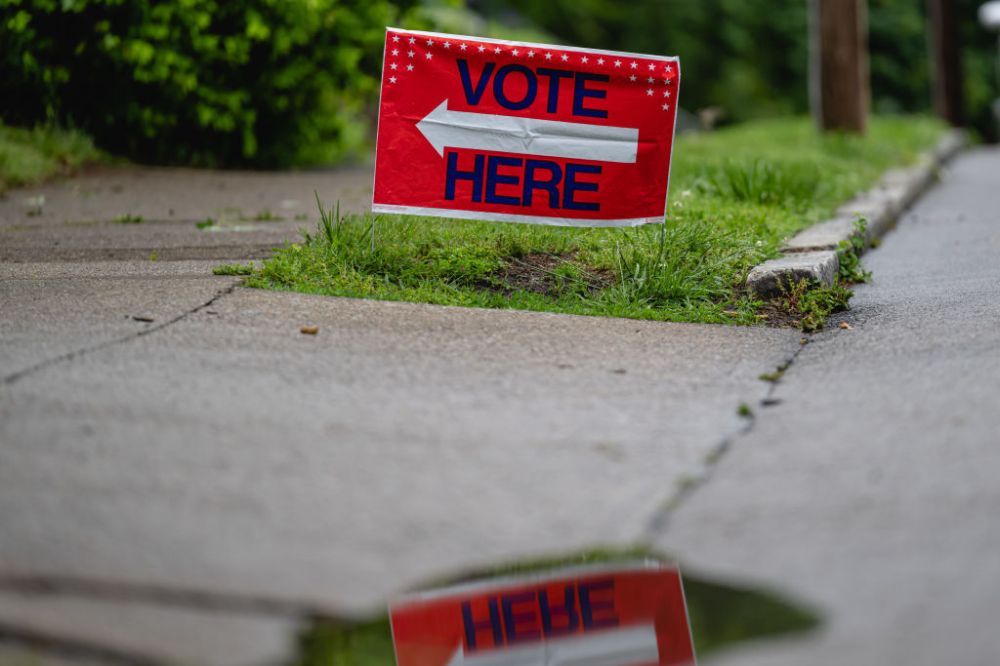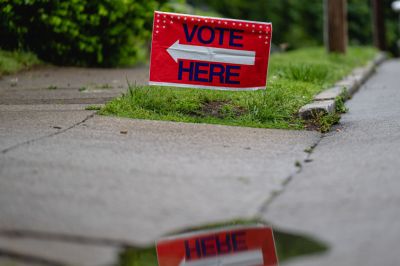Hello and happy Sunday. As we head into an off-year Election Day this week, are there any big races in your city or state? Kentucky, Louisiana, and Mississippi are electing governors, state legislatures will be determined in Virginia and several other states, and a bunch of cities are voting in mayoral races. Here in the Ohio bureau, there’s one election I’m paying extremely close attention to: our district’s school board.
You might be wondering why I’m bringing up a local suburban Cincinnati election in a newsletter to readers from all over the country. Believe me, if the candidates running were debating things like busing policy, our district’s state-testing scores, or the length of the school day, I wouldn’t bore you. But the issues facing our district are also playing out all over the country.
Two years ago, we had a trio of candidates run together on a “parents rights” platform—one of the candidates was also a full-on “Stop the Steal” adherent and had shared QAnon-type conspiracy theories on social media. She didn’t win, but her two allies did. Since then, we’ve had very public fights about removing books from the curriculum and whether the district needs to put an operating levy on the ballot even though, without one, the district faces steep budget cuts. This time around, we have two candidates who have aligned themselves with those “parents rights” board members, and one of them was a member of the anti-government sovereign citizen movement and two years ago tried to have the then-members of our school board arrested. It’s hard to see them bringing anything to the board besides disruption.
Similar scenes are playing out all over the country. A district near my aunt’s home in Pennsylvania got a full writeup in Politico, which also detailed how the Moms for Liberty group is trying to get conservative (read: MAGA) candidates elected in many localities.
Some of this is undoubtedly—and even (somewhat) understandably—an outgrowth of the pandemic, when parents got a look at what their kids were doing once school was on Zoom, and when teachers’ unions in big cities fought efforts to get schools back open. But the past few years have really just accelerated the unhealthy nationalization of local politics. Not every district is under the thumb of a powerful union, and not every district is teaching critical race theory or stocking the school library with explicit books. But to hear some of these candidates talk, you’d think Drag Queen Story Hours are being held in every classroom.
I saw a Facebook post about the election in my aunt’s district, where a candidate opposed to the Moms for Liberty candidates said, “Vote for Democratic candidates to keep their extreme candidates out of our schools.” I’m all for keeping extreme candidates out of school board races, but this kind of thinking represents another problem: School board elections shouldn’t be partisan in the first place.
We’ve written a lot about polarization here at The Dispatch, largely from a national perspective. But the decline in local media, and the tendency for everyone to get their local news (and gossip) from social media, has brought that polarization to local politics, too.
I started this post with a question, and I would love to hear about what kind of issues are affecting your local elections. Thanks for reading, and have a great Sunday.
Do you remember when campus progressives claimed that offensive speech is literal violence and that hurting someone’s feelings is tantamount to bigotry? Jonah does, and in the Wednesday G-File (🔒), he notes that the response to the war between Israel and Hamas by too many on the left—defending the atrocities committed by Hamas, harassment of Jewish people—has exposed all of that language policing for what it was: “The verbal night-sticking used by the DEI industrial complex is little more than an attempt to intimidate people into licking frozen flagpoles in the playground.” But he goes on to identify a bigger problem: Just as the right has split between conservatives and populists, the left has split between liberals and progressive post-liberals. “For starters, the intellectual left has a lot more post-liberals in it than the right does, and the left’s post-liberals have much better perches,” he writes. “A lot of them have tenure. But the more relevant point is that the left cannot endure as a coherent movement with a faultline like the one we see opening up before us.”
Douglas Ollivant gets right to the point with his first sentence: “Urban conflict is messy.” He goes on to explain what Israeli forces can expect to encounter in Gaza—the enemy poses threats from above and below—and how they will likely work to take any advantages away from Hamas. Citing the Iraqi military’s fight to reclaim Mosul from ISIS as a comparison to the IDF’s battle in Gaza, Ollivant points to a grim reality: Expect high casualties for Israeli forces and an unfortunate civilian death toll. “This brings up a number of relevant but incredibly terrifying questions,” he writes. “Can Israel, and the region, sustain a months-long campaign? What happens in local capitals? In the ‘Arab street’? In EU capitals? To the Israeli economy with its mobilized reservists? To Middle-East dependent oil supplies? Can Hezbollah remain out of the fray if the fight drags out? Can the U.S. remain on the sidelines if Hezbollah jumps in? Can Israel absorb extremely high per capita casualties? Will Western intelligence and police forces be able to detect and prevent likely terrorist attacks?”
Late last month, a man killed 18 people and injured 13 others in Lewiston, Maine. A common refrain in the wake of such tragedies is that “no one saw it coming,” but that’s typically not entirely true. Killers often have mental health issues and have threatened violence in the past, and this case was no different. The killer was an Army reservist, and the military had determined that he should not have access to a weapon or ammunition. An Army colleague had alerted the local police, who contacted the family but did little else. His ex-wife knew: Their divorce decree stated that he had to keep all of his guns locked up. He was at least denied the purchase of a suppressor from a local gun shop based on his answer to a question on his background check. Kevin writes: “If anything is clear from the events preceding the bloodbath in Maine—in which everybody from the military to the police to friends and family and mental health authorities had good reason to intervene and the legal means to do so—it is that this is not, as our friends in the gun control movement insist, mainly a question of more robust retail regulation of sporting goods stores. The gun shop clerks in this story did what they were supposed to do: They declined to make a sale to someone they had reason to believe was a prohibited person. The police, on the other hand, basically punted public safety to the lunatic’s brother, asking him to lock up the guns and then more or less crossing their fingers and hoping for the best.”
It’s not necessarily surprising that GOP Rep. George Santos of New York would be subject to a motion to expel him from the House (which ultimately failed). He was exposed as a serial liar shortly after being elected, he’s facing 23 felony charges for financial crimes, and the House Ethics Committee is investigating him. What might be surprising, though, is who brought the motion: the other freshmen GOP representatives from New York. In Dispatch Politics, Andrew writes about the unique nature of the bloc and why they opted to go after Santos. Reps. Anthony D’Esposito, Nick LaLota, Marc Molinaro, Brandon Williams, and Mike Lawler all won in 2022 in districts that President Biden had carried in 2020. They were aided in part by an impressive showing by former Rep. Lee Zeldin in the state’s gubernatorial race against Kathy Hochul, but they won’t have that advantage in 2024. What they do have going for them is that their surprising victories helped the GOP secure the House majority in an otherwise disappointing midterm, and they know it.
Here’s the best of the rest:
- For nine months now, GOP Sen. Tommy Tuberville of Alabama has single handedly held up important military promotions that must be approved by the Senate over his opposition to the Defense Department’s policy of reimbursing travel costs for servicemembers who go out of state to get abortions. Even members of his own party are now exasperated, and Haley has the details in Uphill (🔒).
- Lots of Republicans want someone besides Donald Trump to be the GOP nominee in 2024, but it’s hard for any one alternative to emerge when there are still so many candidates. David Drucker writes about the party’s inability to force any consolidation on the field.
- It’s an uncomfortable conversation for myriad reasons, but a necessary one. Joe Biden’s age is a concern among voters—even Democrats—which makes his choice of a running mate a little more important than normal. And Kamala Harris suffers from low approval ratings and a notable lack of any accomplishments. Gary Schmitt argues the best thing Biden can do is to find someone else to run with.
- Does the 14th Amendment clause barring anyone who’s taken an oath as an “officer of the United States” and participated in an insurrection disqualify Trump from running for office? That’s a question that prompts a host of other questions. In The Collision, Mike and Sarah do their best to answer them.
- Hamas’ attack on Israel has prompted a disturbing increase in antisemitism, both in the U.S. and around the world. Charlotte cites several examples—a mob at an airport in Russia seeking out Jewish passengers on a flight from Israel, a demonstration outside the Sydney Opera House, violence against Jewish students at Tulane University—and notes that the Biden administration is taking steps to combat antisemitism on campuses but the U.N. can’t even muster support for a motion to condemn Hamas.
- On the pods: The Obama administration wreaked havoc with the adjudication of campus sexual assault claims back in 2011, and the fallout continues today. On Advisory Opinions, David and Sarah discuss the conflict between due process and defamation that has resulted. We have a new host for Monday editions of The Dispatch Podcast, political commentator Jamie Weinstein. He kicked things off by interviewing George Mason law professor Jeremy Rabkin about international law as it relates to the conflict between Israel and Hamas (and he joined the gang to discuss Mike Pence’s withdrawal from the GOP primary and the potential demise of the social justice movement). And on the solo Remnant, Jonah goes on a rant against kids these days.







Please note that we at The Dispatch hold ourselves, our work, and our commenters to a higher standard than other places on the internet. We welcome comments that foster genuine debate or discussion—including comments critical of us or our work—but responses that include ad hominem attacks on fellow Dispatch members or are intended to stoke fear and anger may be moderated.
With your membership, you only have the ability to comment on The Morning Dispatch articles. Consider upgrading to join the conversation everywhere.